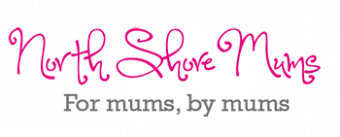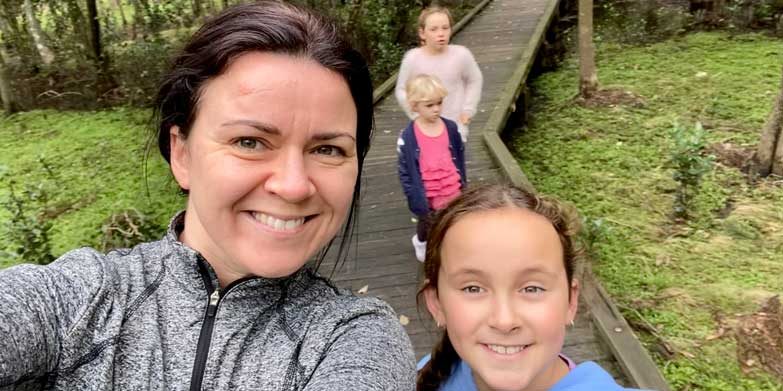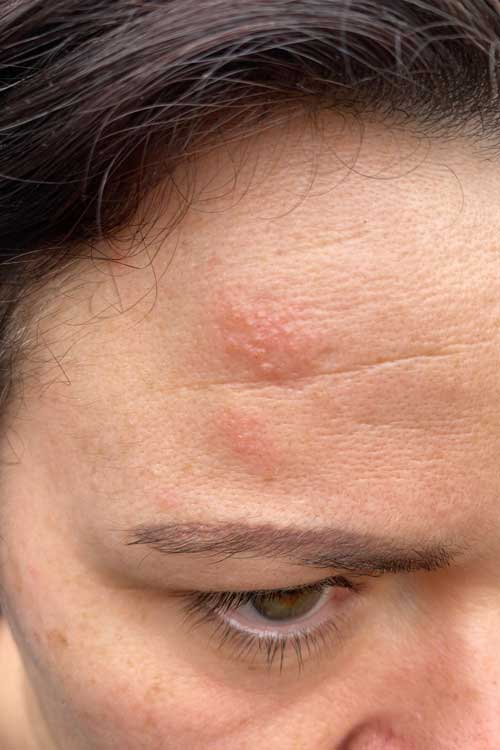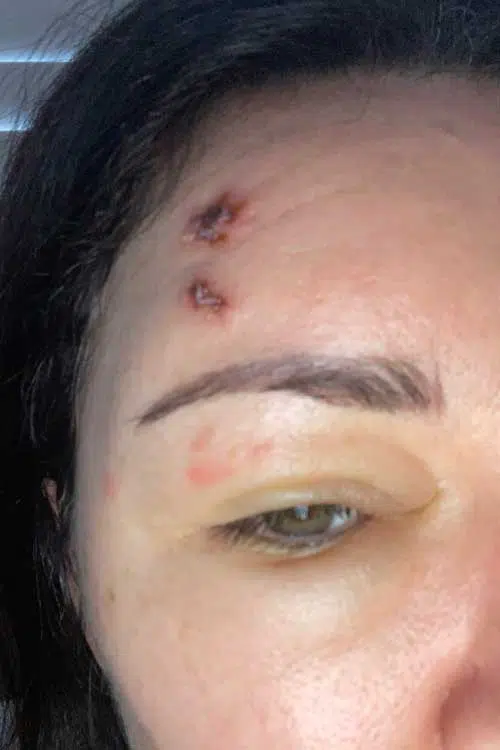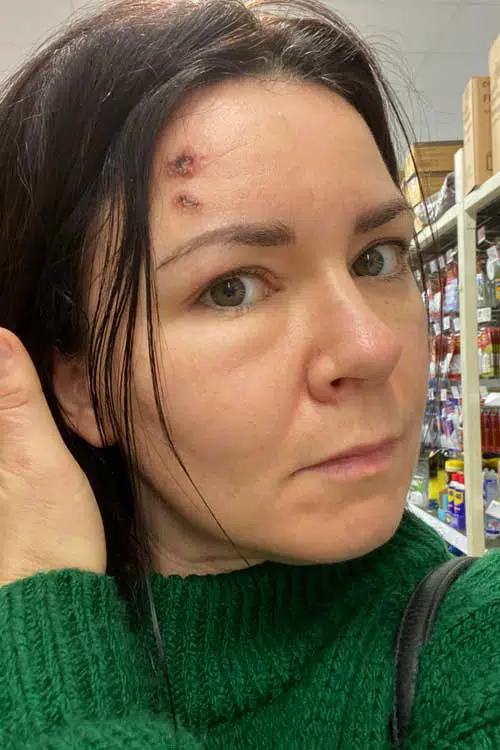Been stressed out by the Covid-19 pandemic? You’re not alone. One of the side effects that this North Shore Mum wasn’t expecting was shingles. If you’ve had chicken pox, the virus lays dormant in your body, and can be reactivated later by stress. Rachel shares her shingles experience…
Like many other stressed-out mums, it was the day I’d been waiting for… the return of children to school, full time. Although I know some people loved the online learning experience with their children (see our survey results), I wasn’t one of them. Working from home whilst trying to motivate my kids to get through their daily assignments and follow the school curriculum, pushed me to my emotional limits. I found myself feeling frustrated, angry, overwhelmed, stressed and often defeated.
So when Monday 25 May came along, my Year 5 and Year 3 daughters skipped through the school gates, delighted to be reunited with their friends and their wonderful teachers.
Meanwhile, I headed to the GP, to get the skin on my face examined. Since the Friday, I’d noticed some small red marks on my forehead. I thought that I’d perhaps been bitten by a spider in my sleep, but when the area got bigger and started swelling underneath and around my ear, I knew I needed to get it looked at by a GP.
“Shingles!” he said, without hesitation. He took a swab of the area for confirmation, but said it was almost definitely shingles. It was the fourth day since I’d noticed the red rash, and I was prescribed some antivirals to hopefully bring it under control.
I must admit, I was pretty surprised to be diagnosed with shingles. I’d only really heard about it happening in elderly people, so it just wasn’t on my radar. Aside from taking the prescribed anti-viral medication and pain killers, I didn’t know what I could do to help it. Fortunately a friend sent me a very helpful text:
Just heard you’re sick with shingles. So sorry to hear. You have to stop completely and rest. I had it quite bad two years ago and I didn’t rest and made myself really ill. So rest up in bed for a few days if you can (absolutely no walking or exercising whatsoever) – it’s really important with shingles to do that even if you don’t feel that bad. Sending you a huge hug.
So I took her excellent advice, and spent the next few days in bed catching up on Netflix and Stan (a real treat, actually!). The kids were back at school and my hubby was still working from home, so could help out with all the drop off and pick ups.
Got a rash? See your doctor ASAP
The best way to avoid getting shingles, is to look at reducing stress in your life. But for busy mums, this is much easier said than done, right? Exercise, meditate, do yoga, pilates, take some time out for yourself… we all know we need to prioritise our own needs, but sometimes it can just seem so hard to find the time. And the stress compounds!
If you develop any kind of rash, it’s important to see your Doctor ASAP to get it checked out. With shingles, you ideally need to start antiviral medication within three days for it to have a good impact. I was diagnosed on Day 4, but luckily it did seem to kick in…
As the swelling was so close to my eye, I also visited an optometrist to check that the virus hadn’t spread to the cornea. Frighteningly, it can actually cause blindness if it enters the eye! Thank goodness it didn’t reach there.
Support from North Shore Mums
By the Wednesday, I felt brave enough to share my Shingles story on our North Shore Mums Instagram page. By this stage, the swelling had moved to my right eye – so much so, that I could hardly open it for three days. It not only looked horrendous, but I was also really worried about the infection moving into my eye – as it can actually cause blindness. It was so lovely to not only get lovely messages of support and ‘get well’, but also I also got lots of private messages from mums who had experienced shingles recently, or knew someone who was. Turns out shingles are on the rise for mums.
- ‘Omg the worst. I had it last year. It literally took over the whole left side of my face. My nose is actually scarred! Hope you feel better soon’ – Ange
- ‘Sending love and a speedy recovery. I had shingles 2 years ago … take care of yourself and rest rest rest xx’ – oliviarealestatemum
- ‘Shingles sounds terrible… one of my customers was suffering a year or so ago… luckily I mentioned it to my Doctor, who arranged for me to have the shot. So pleased with that protection.’ – trendinteriorslindfield
- ‘That’s not fun 🙁 mums there is a vaccine for shingles now my mum highly recommended to me (and I got) because she’s had shingles twice and it is incredibly painful wishing you a fast recovery Rachel!’ – watersidebistrosydney
- ‘I had it on my neck in my 20s! It was horrific as my clothes rubbed onto and hurt like hell! It took a few weeks at least to recover. Regular pain meds and lots of rest. I think it was some of the worst pain I have ever experienced and I have three kids too’ – Jenna
How you can avoid shingles…
Shingles is much more common in elderly people, but given the huge amount of stress that we’ve all been under recently, it’s something that is coming up much more with younger people in their 30s and 40s. In fact, Dr Corina Vidgen from Myheatlh Castle Towers reported,
“Over the COVID isolation period, I saw several young people with shingles. This is unprecedented in my medical practice, as a GP for over 12 years.” – Dr Corina Vidgen
Aside from lots of rest, no exercise, lots of water and the prescribed antiviral medication, I also visited an incredible Chinese Acupuncturist and Herbalist, who I really believe had a significant impact on the reduction of symptoms. I went to see him on the Thursday (a morning where I couldn’t even open my eye due to the swelling) – and by the Sunday, the swelling had almost completely gone down. And I didn’t develop any more rashes after visiting him.
Besides looking at ways as to how you can manage stress in your life, the best option for preventing shingles in though the vaccine. Although there is no effective COVID-19 vaccine yet, there is effective vaccination against shingles. It’s free for people over 70, but you can certainly talk to your GP to see if they would recommend you have it.
How I’m feeling now…
Three weeks on, and I’m feeling a million times better. There’s still a bit of a scab where the rash was and it’s feels quite numb around the area, but overall I think I’ve managed to come out of it quite well. Some people can suffer with it for months, and it can also reoccur multiple times. I really hope not!
Sometimes when I feel my stress levels increasing, I can actually feel tingling in my scalp. It’s a good reminder to take a few deep breaths and try to calm down.
Next time I get a rash or bite like this, I’ll get to the doctor straight away.
To get the latest facts about shingles, we spoke to Dr Corina Vidgen, who is a General Practitioner at Myhealth Castle Towers, Castle Hill. You can also visit the Australian Government Department of Health website.
What is shingles?
Shingles (Herpes Zoster) is caused by a reactivation of the virus that causes chickenpox. Usually occurs in adulthood, many years after the initial chicken pox infection, and develops more often in people who are immunosuppressed. After having a bout of chicken pox, the virus lays dormant in the spinal cord and when it reactivates, it does so from a particular segment of the spinal cord giving rise to symptoms and rash in a given dermatomal distribution that corresponds to the level of spinal cord affected.
What are the first signs of shingles?
The illness is characterised by a painful chickenpox-like rash on a small area of skin, usually on one side of the body. The rash is often preceded by a dull aching pain, or a burning sensation over the area of the body that the virus is affecting. Pain and tingling associated with the rash may persist for weeks or months after the rash has cleared. This is called post-herpetic neuralgia. There are certain medications that can be prescribed by your GP that can help minimise this pain.
How is shingles treated?
Shingles can be treated with special antiviral drugs such as acyclovir. Your general practitioner can advise on ways to minimise the discomfort associated with the symptoms of infection. It is important that the anti viral medication is commenced as soon as possible after the rash develops. This can help decrease the likelihood of post-herpetic neuralgia.
If you’re diagnosed with shingles, what should you do?
If you suspect you have shingles, you should seek medical attention by your GP as soon as possible. Avoid applying any creams or ointments to the blistering rash. The virus can be spread by direct contact with the skin rash of infected people. This causes chickenpox in people who are not immune. It is therefore important to avoid exposing anyone to the rash – keep it covered if possible and avoid touching it as the virus can be transferred by direct contact.
Most of our readers are in their 30s and 40s. Is shingles something they should be aware of?
Shingles is more common in the elderly and immunosuppressed people. However, it can occur in younger people, particularly at times of intense stress (physical and psychological).
Over the COVID isolation period, I saw several young people with shingles and this is unprecedented in my medical practice as a GP for over 12 years.
It is a condition worth being aware of, as early treatment is associated with the best outcomes.
Can you tell us about the shingles vaccine?
- Adults 71-79 years of age are eligible for free vaccine under a catch up program until 31 October 2021. A single dose of zoster vaccine is recommended and funded for adults at 70 years of age.
- Adults aged 60–69 years are also recommended to have a single dose of zoster vaccine but this is not funded. The exact duration of vaccine efficacy is not known but protection does wane over time. The need for revaccination is not yet determined.
- Adults under 59 years are not routinely recommended to receive zoster vaccine, but they can receive it if they want to protect themselves against Shingles.
The cost varies depending on the pharmacy. It’s approximately $200 to buy on private script.
Find out more about the shingles vaccine.
